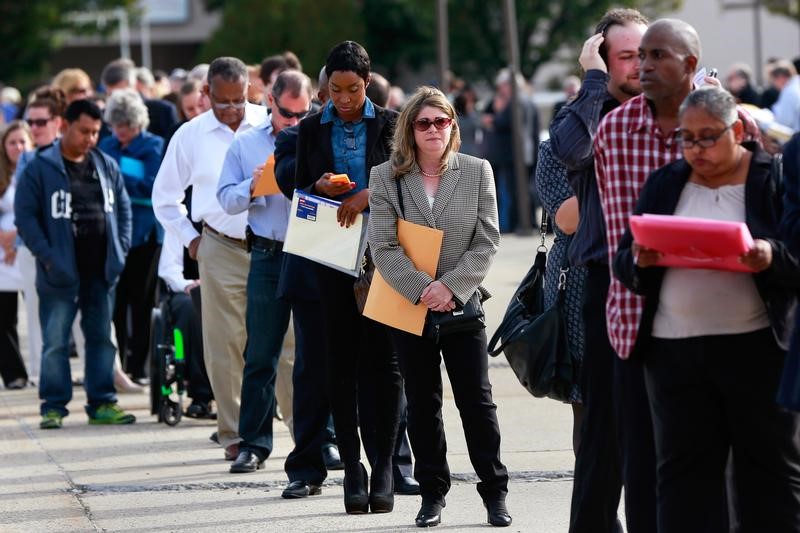By Lucia Mutikani
WASHINGTON (Reuters) - The number of Americans filing for unemployment benefits unexpectedly fell last week to near a 43-year low, amid a further tightening of the labour market that could eventually spur faster wage growth.
Other data on Thursday showed inventories at wholesalers surged in December for a second straight month and sales recorded their biggest increase since 2011, signs of confidence in the economy as domestic demand strengthens.
Initial claims for state unemployment benefits dropped by 12,000 to a seasonally adjusted 234,000 for the week ended Feb. 4, the Labor Department said. That left claims just shy of the 43-year low of 233,000 touched in early November.
Claims have now remained below 300,000, a threshold associated with a strong labour market, for 101 straight weeks. That is the longest stretch since 1970, when the labour market was much smaller.
"There is no sign of a pickup in layoff activity. We continue to view the signal of extremely subdued layoffs from the jobless claims data as evidence of companies attempting to retain their workers in a tight labour market," said John Ryding, chief economist at RDQ Economics in New York.
Prices of U.S. Treasuries fell, with yields rising to session highs, while the dollar rose against a basket of currencies.
The labour market is at or close to full employment, with the unemployment rate at 4.8 percent after hitting a more than nine-year low of 4.6 percent in November. The economy created 227,000 jobs in January.
Further tightening in labour market conditions could boost wage growth, which has remained stubbornly sluggish despite anecdotal evidence of more companies struggling to find qualified workers.
PRETTY UPBEAT SIGNAL
Lacklustre wage growth, if sustained, could hurt consumer spending and crimp economic growth. Economists polled by Reuters had forecast first-time applications for jobless benefits rising to 250,000 in the latest week.
"Today's report sent a pretty upbeat signal about conditions in the job market," said Daniel Silver, an economist at JPMorgan (NYSE:JPM) in New York. "It looks like conditions in the job market have remained solid in the few weeks since the reference period for the January payroll report."
The four-week moving average of claims, considered a better measure of labour market trends as it irons out week-to-week volatility, fell 3,750 to 244,250 last week, the lowest level since November 1973.
The claims report also showed the number of people still receiving benefits after an initial week of aid increased 15,000 to 2.08 million in the week ended Jan. 28. The four-week average of the so-called continuing claims fell 3,750 to 2.08 million.
In a separate report on Thursday, the Commerce Department said wholesale inventories increased 1.0 percent after a similar jump in November. The back-to-back strong increases of stock accumulation, however, suggest a moderation in the pace of inventory investment in the months ahead.
Wholesale stocks excluding autos, the component of wholesale inventories that goes into the calculation of gross domestic product, increased 0.9 percent in December.
Inventory investment contributed one percentage point to the economy's 1.9 percent annualised growth rate in the fourth quarter. That was the second straight quarterly contribution to GDP growth. Inventories had been a drag on GDP growth since the second quarter of 2015.
Sales at wholesalers jumped 2.6 percent in December, the largest increase since March 2011, after increasing 0.5 percent in November.

At December's sales pace it would take wholesalers 1.29 months to clear shelves, the smallest since December 2014 and down from 1.31 months in November. The ratio has declined from the 1.37 months touched in January of last year, which was the highest since March 2009.